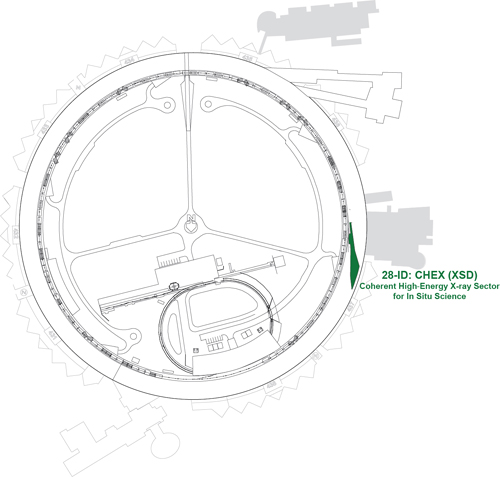
You are invited to participate in a workshop on “Data Handling at the APS Coherent High-Energy X-ray (CHEX) Sector.” This online workshop will be held via Microsoft Teams on Thursday and Friday, October 21 and 22, 2021.
This workshop will focus on providing a forum to discuss a number of issues related to the plans for data handling at CHEX, including experimental control, data collection, and various data analysis methods relevant to the types of experiments that will take place at CHEX. It will consist of several invited talks, followed by opportunities for participant questions and discussion. A tentative agenda for the workshop is attached below.
This is part of a series of workshops the Advanced Photon Source (APS) is holding to enable scientists to learn about opportunities to perform world class research at CHEX, which is being built as part of the APS Upgrade. CHEX will advance the frontier for in situ, real time studies of materials synthesis and chemical transformations in natural operating environments, using the unprecedented coherence of the high energy x-ray beams that will be provided by the APS Upgrade. Coherent diffractive imaging and photon correlation spectroscopy will provide transformative insight into materials structure, its heterogeneity and disorder, chemical and long-range interactions, dynamics, and evolution under real-world conditions and time frames. The new beamlines that are being built will be optimized for the use of coherent x-ray techniques at the high energies needed for in situ studies. Multiplexed, simultaneously operating beamlines will efficiently accommodate large, complex apparatus and amplify the beamtime available for programs to address high-impact problems.
Please register for the workshop by sending an email message to CHEXWorkshop@anl.gov, including your name, affiliation, citizenship, and email address. The link to connect to the meeting will be provided in an email to registered participants a few days before the workshop. There is no workshop registration fee. If you have questions about the workshop, please contact Jeff Eastman at eastman@anl.gov.
Workshop on data handling at the CHEX Sector, Thursday and Friday, October 21 and 22, 2021
Agenda for Thursday, October 21
|
Time (CDT) |
Speaker |
Topic |
|
9:00 – 9:30 |
Matt Highland (APS) |
CHEX Overview |
|
9:30 – 10:00 |
Nicholas Schwarz (APS) |
APS-U Computing overview |
|
10:00 – 10:30 |
Stuart Wilkins (NSLS-II) |
Data handling philosophy at NSLS-II |
|
10:30 – 11:00 |
Joseph Sullivan (APS) |
Plans for experiment control and data collection with Bluesky at APS |
|
11:00 – 11:15 |
Break |
|
|
11:15 – 11:45 |
Barbara Frosik (APS) |
Current state of 'cohere', a package for CDI reconstruction |
|
11:45 – 12:15 |
Ross Harder (APS) |
CDI from an experimental beamline staff perspective |
|
12:15 – 12:45 |
Stephan Hruszkewycz (ANL/MSD) |
Analysis methods for CDI |
|
12:45 – 1:15 |
Siddharth Maddali (ANL/MSD) |
High-energy coherent X-ray diffraction microscopy |
|
1:15 – 1:30 |
Anthony Avarca (ANL/NST) |
Overview of the lab’s current plans related to digital notebooks |
|
1:30 – 2:00 |
General questions and discussion |
|
Agenda for Friday, October 22
|
Time (CDT) |
Speaker |
Topic |
|
9:00 – 9:30 |
Mathew Cherukara (APS) |
AI/Machine Learning Overview |
|
9:30 – 10:00 |
Maria Chan (ANL/CNM) |
AI/ML-informed approaches to crystallography and spectroscopy |
|
10:00 – 10:30 |
Yudong Yao (APS) |
AI-accelerated X-ray Coherent Diffraction Imaging |
|
10:30 – 11:00 |
Eric Dufresne (APS) |
XPCS from an APS beamline staff perspective |
|
11:00 – 11:15 |
Break |
|
|
11:15 – 11:45 |
Karl Ludwig (B.U.) and Peco Myint (APS) |
XPCS at NSLS-II: A Users Perspective |
|
11:45 – 12:15 |
Peter Zapol (ANL/MSD) |
Integration of KMC and DFT methods with coherent X-ray studies |
|
12:15 – 12:45 |
Hua Zhou (APS) |
Data handling and analysis for CTR/COBRA toward high energy and coherence |
|
12:45 – 1:00 |
Suresh Narayanan (APS) |
Remote pipeline demo |
|
1:00 – 1:30 |
General questions and discussion |
|
The Advanced Photon Source is a U.S. Department of Energy (DOE) Office of Science User Facility operated for the DOE Office of Science by Argonne National Laboratory under Contract No. DE-AC02-06CH11357.
The U.S. Department of Energy's APS is one of the world’s most productive x-ray light source facilities. Each year, the APS provides high-brightness x-ray beams to a diverse community of more than 5,000 researchers in materials science, chemistry, condensed matter physics, the life and environmental sciences, and applied research. Researchers using the APS produce over 2,000 publications each year detailing impactful discoveries, and solve more vital biological protein structures than users of any other x-ray light source research facility. APS x-rays are ideally suited for explorations of materials and biological structures; elemental distribution; chemical, magnetic, electronic states; and a wide range of technologically important engineering systems from batteries to fuel injector sprays, all of which are the foundations of our nation’s economic, technological, and physical well-being.
Argonne National Laboratory seeks solutions to pressing national problems in science and technology. The nation's first national laboratory, Argonne conducts leading-edge basic and applied scientific research in virtually every scientific discipline. Argonne researchers work closely with researchers from hundreds of companies, universities, and federal, state and municipal agencies to help them solve their specific problems, advance America's scientific leadership and prepare the nation for a better future. With employees from more than 60 nations, Argonne is managed by UChicago Argonne, LLC, for the U.S. DOE Office of Science.
The U.S. Department of Energy's Office of Science is the single largest supporter of basic research in the physical sciences in the United States and is working to address some of the most pressing challenges of our time. For more information, visit the Office of Science website.
